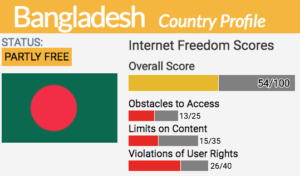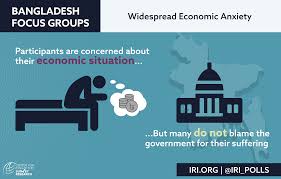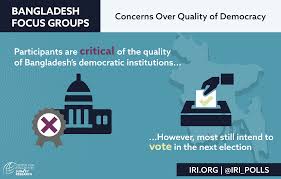 Bangladesh security forces have been arresting and intimidating opposition figures and threatening freedom of expression in advance of national elections on December 30, 2018, Human Rights Watch said today:
Bangladesh security forces have been arresting and intimidating opposition figures and threatening freedom of expression in advance of national elections on December 30, 2018, Human Rights Watch said today:
The United Nations, European Union, United States, India, China, and others should press the government of Prime Minister Sheikh Hasina Wazed to create conditions conducive to a free and fair vote and to prevent campaign violence.
Human Rights Watch research from October to early December found repeated instances of arbitrary security force arrest and detention of protesters and political opposition figures, and acts of violence and intimidation by members of the ruling party’s student and youth wings. The crackdown, and the broad and vaguely worded laws that facilitate it, are contributing to an environment of fear. Institutions including the judiciary and the national election commission do not appear to be fully prepared to independently and fairly resolve disputes around campaigns and elections, such as on registration, candidacies, and results.
 “The Awami League government has been systematically cracking down on independent and opposition voices to ensure that the ruling party faces no obstacles to total political control,” said Brad Adams, Asia director at Human Rights Watch. “Members and supporters of the main opposition parties have been arrested, killed, even disappeared, creating an atmosphere of fear and repression that is not consistent with credible elections.”
“The Awami League government has been systematically cracking down on independent and opposition voices to ensure that the ruling party faces no obstacles to total political control,” said Brad Adams, Asia director at Human Rights Watch. “Members and supporters of the main opposition parties have been arrested, killed, even disappeared, creating an atmosphere of fear and repression that is not consistent with credible elections.”
As instability roils Bangladesh, the outcome of its upcoming national election is far from certain. At the International Republican Institute (IRI), our new public opinion poll in Bangladesh highlights the dynamics that are likely to shape the upcoming election campaign, its result, and post-election stability, IRI’s Steve Cima and Geoffrey Macdonald wrote for the Council on Foreign Relations. The poll shows that Bangladesh’s citizens are losing confidence in democratic institutions and processes.
Allegations of Partisan Election Commission
In cooperation with the UK and Switzerland, the U.S. is funding 15,000 local election observers working under the Election Working Group (EWG), a consortium of civil society groups, according to reports:
 The National Democratic Institute [NDI and IRI are core institutes of the National Endowment for Democracy] sent a five-member pre-assessment mission in October and the second pre-assessment mission in December….NDI’s sub-grant partner, the Asian Network for Free Election, has dedicated two international electoral analysts to cover the election and will be sending international long-term and short-term observers.
The National Democratic Institute [NDI and IRI are core institutes of the National Endowment for Democracy] sent a five-member pre-assessment mission in October and the second pre-assessment mission in December….NDI’s sub-grant partner, the Asian Network for Free Election, has dedicated two international electoral analysts to cover the election and will be sending international long-term and short-term observers.
With annual GDP growth rates around 7%, Bangladesh is one of Asia’s most successful economies, the Hudson Institute adds. Yet on the political front, the country faces many challenges. With the rising influence of Islamist groups like Bangladesh Jamaat-e-Islami in the country’s politics and accusations of authoritarianism against Sheikh Hasina, Bangladesh’s current and longest-reigning Prime Minister, the outcome of the December 30 elections will be important for both Bangladeshis and the region.







